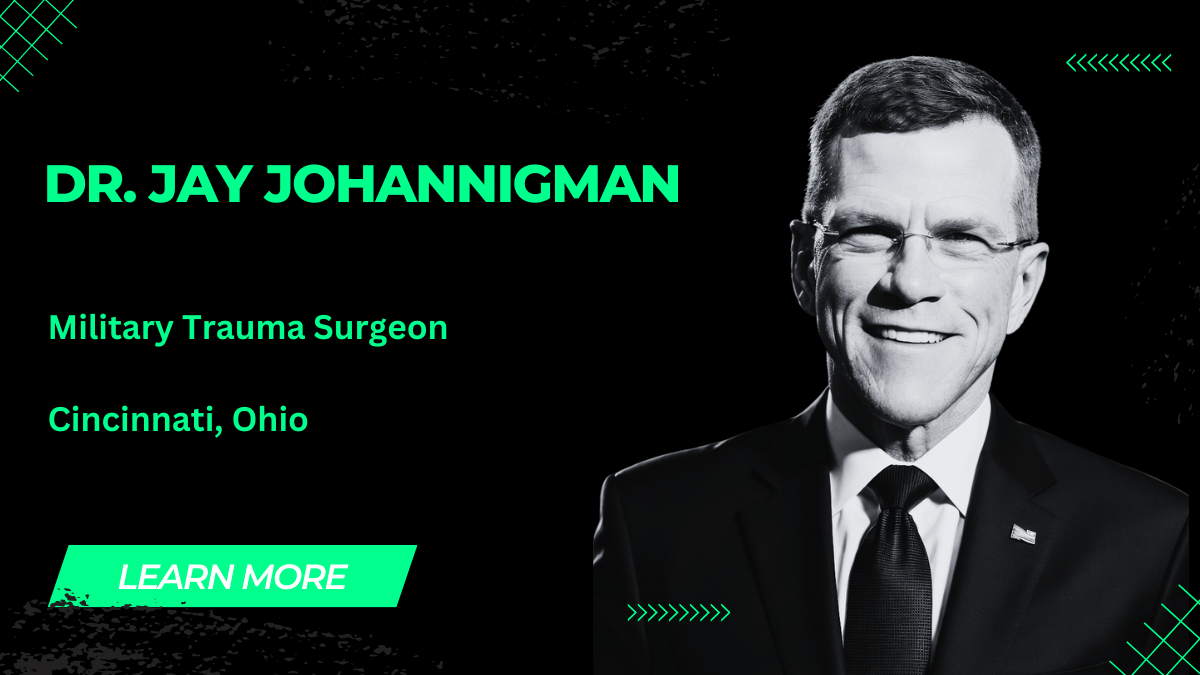
Dr. Jay Johannigman has built a remarkable career spanning four decades. His contributions have shaped trauma care and advanced aeromedical transport from military to civilian healthcare. He’s a seasoned trauma and critical care surgeon with leadership roles in both academic and military settings. Dr. Johannigman’s experience includes seven combat deployments, hundreds of academic contributions, and influential work in military-civilian medical partnerships.
Now affiliated with Centura at St. Anthony Hospital in Colorado, he plans to return to Cincinnati, his hometown, to continue his work. In this interview with SurveyNow, Dr. Johannigman shares his perspectives on success, entrepreneurship, and staying productive.
How do you define success, and how long did it take you to find it?
Success is aligning passion with purpose. For me, it wasn’t about titles or accolades. It was about making a tangible difference in people’s lives. That realization came early in my career during my first deployment. Seeing the direct impact of our work in saving lives made me feel successful, even without traditional measures of achievement.
What are the qualities of a good entrepreneur?
Curiosity and adaptability are the foundation of progress. Entrepreneurs, much like medical leaders, thrive by questioning the status quo. It’s not about following the usual path—it’s about asking why things are done a certain way and imagining how they could be better. Embracing change is essential because the world moves quickly, and those who adapt find the best opportunities.
What challenges did you have to overcome at the beginning of your journey?
Transitioning from military to civilian roles was a challenge. Each system has unique demands. In the military, decisions often need to be quick and decisive. Civilian healthcare is more collaborative and complex. Balancing these perspectives took time, but it helped me grow.
What’s one trend that excites you?
One trend that excites me is bringing back the use of whole blood in trauma care. This approach started in the military and is now being used in civilian healthcare with great success. The idea is simple: instead of separating blood into parts like plasma, platelets, and red cells, we use whole blood, just as it exists naturally. This method has proven to be very effective in saving lives, especially in emergencies.
In Denver, we’ve taken big steps to make whole blood available not only in hospitals but also at the scene of accidents. We’re working with first responders to carry whole blood on ambulances and helicopters. This means that care can start immediately, even before a patient gets to the hospital. Giving whole blood early can help stabilize patients, reduce complications, and increase survival rates.
What’s exciting about this is how it combines military advancements with civilian healthcare. Denver is leading the way in this effort, and I believe it could spread across the country. If all emergency services carried whole blood, countless lives could be saved. This isn’t just a new idea—it’s a smarter, faster way to provide care when every second counts.
What advice would you give your younger self?
Take more risks. Early in my career, I was cautious and overly focused on avoiding mistakes. I worried that failure would overshadow my accomplishments or set me back. But looking back, I realize that being too careful can hold you back from real growth.
The truth is, calculated risks often open doors to unexpected opportunities. Some of the biggest breakthroughs in my career came from taking a chance—whether it was applying innovative battlefield techniques to civilian trauma care or stepping into leadership roles before I felt fully ready.
Trusting your instincts and stepping out of your comfort zone are essential for progress. It’s in those moments of uncertainty that you push your boundaries, learn valuable lessons, and discover what you’re truly capable of. Playing it safe might feel secure, but it rarely leads to transformative outcomes. Taking thoughtful risks is where growth truly happens.
What is one habit that helps you be productive?
Regular exercise sharpens my focus and keeps me energized throughout the day. Movement clears my mind and prepares me for the challenges ahead, whether it’s a morning run or a quick gym session.
I also incorporate mindfulness and meditation into my routine. Just ten minutes of quiet reflection helps me center my thoughts, manage stress, and approach problems with a clear perspective. These habits aren’t just about physical health—they’re tools to maintain mental clarity and resilience in high-pressure situations.
When you feel overwhelmed or unfocused, what do you do?
One of my favorite ways to clear my mind is riding my bicycle around Cincinnati. Riding along the Ohio River provide a sense of calm and perspective. The physical activity helps me decompress, while the familiar sights remind me of why I do this work. I also lean on trusted colleagues for insight. Collaboration brings clarity and often sparks new ideas I hadn’t considered. Balancing movement and meaningful conversations keeps me focused and productive.
Takeaway
Dr. Jay Johannigman exemplifies resilience and forward-thinking leadership, seamlessly blending military precision with civilian healthcare expertise. His ability to adapt and implement battlefield innovations, like en route care and whole blood utilization, has transformed trauma systems and saved countless lives. Beyond his technical skills, his mentoring of young professionals ensures these advancements will continue evolving with future generations.
Success for Dr. Johannigman isn’t about accolades; it’s about impact. His journey highlights the importance of staying curious, embracing change, and prioritizing collaboration over individual recognition. By consistently learning and listening, he pushes boundaries and sets new standards in trauma care. His unwavering commitment to innovation and excellence serves as a lasting inspiration, reminding us all that meaningful success lies in the difference we make.
Do you want to see more of Dr. Jay Johannigman? Follow him on Twitter, LinkedIn, and visit his website!
